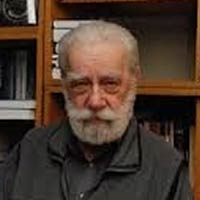Roman Słania
Roman Słania, Pole of Jewish origin. Stanisław Dąbrowa-Kostka Stanisław Dąbrowa-Kostka (1924-2019) - lieutenant of the Home Army, lieutenant colonel of the Polish Army. During the Second World War, he was active in the Podkarpacie region. Awarded many times, author of books, studies and articles. Involved in scouting activities. He actively participated in the work of the Commission for the Investigation of Nazi Crimes. in his book "In Occupied Krakow" (polish: "W okupowanym Krakowie") wrote about him:
Stanisław Dąbrowa-Kostka (1924-2019) - lieutenant of the Home Army, lieutenant colonel of the Polish Army. During the Second World War, he was active in the Podkarpacie region. Awarded many times, author of books, studies and articles. Involved in scouting activities. He actively participated in the work of the Commission for the Investigation of Nazi Crimes. in his book "In Occupied Krakow" (polish: "W okupowanym Krakowie") wrote about him:
Young and intelligent, he participated in the September campaign and was even injured. After returning to Krakow, he did not start working. He wandered on the streets and pubs. He quickly made contact with the Gestapo(german: Geheime Staatspolizei) The Secret State Police established in the Third Reich, which ruthlessly fought against all forms of resistance in the occupied territories. Identified with the most terrible German crimes against Poles, and after 1942 also against Jews. Disbanded with the fall of the Third Reich in 1945. Recognized as a criminal organization by the International Military Tribunal in Nuremberg.. Recruited to the confidant service, he formed his own gang.
The closest Słania's entourage was the Krzemkow brothers, Zając from Wola Duchacka and the son of the butcher Żaczek. Słania's gang quickly gained the worst fame. Its members were armed by the Gestapo. Being aware of the occupant's support, they were committing their crimes semi-openly, blackmailing and even robbing. In addition to the premises allocated for them by the Germans, they had hiding places in locations they only knew. There, the darkest things were discussed and there were also libations with orgies during splitting the loot.
He was arrested several times by the blue policeThe Polish Police of the General Government (German: Polnische Polizei im Generalgouvernement), commonly referred to as the blue police - municipal police, financed by Polish local governments (residual local government structures, under the supervision of the German civil administration), subordinated to the local commanders of the German order police - Ordnungspolizei., each time he was handed over to the Gestapo on direct orders from Pomorska StreetDuring World War II, the Gestapo headquarters and the temporary detention facility located in the basement were located on Pomorska Street. The testimony of those times are the inscriptions made by prisoners on the walls of the cells. Currently, it houses a branch of the Historical Museum of the City of Krakow., and then released. The intervention of the informant's guardians was taking place so quickly, that there was even no time to interrogate the detainee, thanks to which Słania and his friends were able to escape the traps set for them by the Polish counterintelligence operating in the ranks of the KripoCriminal Police (German: Kriminalpolizei, Kripo) - German criminal police. The Kripo formally dealt mainly with criminal matters, leaving the Gestapo with political matters and organizing terror. However, in fact, quite often there were cases of cooperation between the two police forces in the fight against political opponents of the Third Reich, in the extermination of Jews, sending people to concentration camps and for providing "guinea pigs" for medical experiments. and the blue police.
Słania and three collaborators subordinate to him were shot during an action provoked by the Polish underground, by Stanisław Szczepanek, pseudonym "Janusz", who worked in the underground in the German Criminal Police (Kripo). Szczepanek had the opportunity to interrogate the arrested gang member (Zając) before the Gestapo released him from police custody (which it always did to his associates). Szczepanek reported the results of the interrogation - Słania's whereabouts - to his german boss, Schubert. Schubert, without informing the Gestapo, immediately sent four Kripo officers (three of them were people from Szczepanek's counterintelligence network) to eliminate the bandit, so Słania was officially killed by the Germans, and the head of Kriminalpolizei - Schubert - instead of the expected praise, had to explain himself to the Gestapo for shooting his secret associates.
Honor, zdrada, kaźń... Afery Polski Podziemnej 1939-1945. Komplet tom 1 i 2
https://www.wyczerpane.pl/honor-zdrada-kazn-afery-polski-podziemnej-1939-1945-komplet-tom-1-i-2.html
http://www.kedyw.info/wiki/Stanis%C5%82aw_D%C4%85browa-Kostka_(1972),_Szajki_Diamanda_i_S%C5%82ani#cite_ref-4